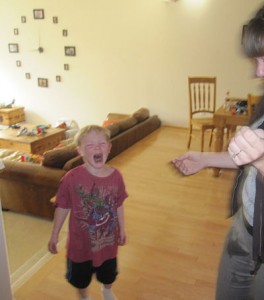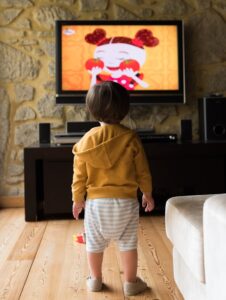We tend to throw around the word “attachment” a lot when talking about kids and parenting, so let’s make sure we’re all talking about the same thing: attachment is a measure of the security of relationship between a child and those one or two or three adults with whom that child is in consistent contact. We now recognize that healthy (secure) attachment is a fundamental form of nourishment for a child’s growing brain. In particular, attachment fosters rich circuitry in the area of the brain that mediates social and emotional functioning. A parent’s ability to be present for a child is fundamental to fostering this brain circuitry needed to regulate attention — therefore, basic ADHD treatment. Mounting research suggests that the social brain is the basis for the child’s lifelong success — in school, at home, and out in the world! (more…)
Posts Tagged ‘social brain’
Presence & Attachment: ADHD Treatment?
Tags: ADD, adhd, attachment, brain development, Dan Siegel, Gabor Mate, presence, social brain
Posted in Parenting for Peace | 2 Comments »
The Trouble with Time-Out
 So there you are one afternoon, at the end of your rope with an out-of-control three-year-old. You know you won’t spank him, and you have become mindful of avoiding shame-based measures, so what’s left? Is “Time Out” the answer? At risk of bringing on the wrath of parents everywhere, my answer is no. Time-outs were conceived as a more humane alternative to spanking, but the problem is, they land a blow to the brain and psyche rather than to the bottom.
So there you are one afternoon, at the end of your rope with an out-of-control three-year-old. You know you won’t spank him, and you have become mindful of avoiding shame-based measures, so what’s left? Is “Time Out” the answer? At risk of bringing on the wrath of parents everywhere, my answer is no. Time-outs were conceived as a more humane alternative to spanking, but the problem is, they land a blow to the brain and psyche rather than to the bottom.
Right at the moment when the child is overwhelmed by a flood of emotions he cannot manage, and he most needs the regulating presence — that is, close physical presence — of his attachment figure, he’s banished to his room or his “Naughty Chair” or his “Thinking Rug” or his [fill in the blank with any of a list of prettied-up names people have devised for this particular form of exile]. (more…)
Tags: attachment, brain development, discipline, Gordon Neufeld, shame, social brain, spanking, time-out
Posted in Parenting for Peace | No Comments »
How Television Violence Affects Children
 So many questions in the wake of Newtown, and an excellent one is about how television violence affects children. As some of the wiser commentators have said, there is no one single reason (not just guns, not just mental illness, not just family dynamics) for a tragedy of such heinous proportions. The question of how television violence affects children is just one thread of the complex tapestry of causes in such tragedies as the Newtown massacre.
So many questions in the wake of Newtown, and an excellent one is about how television violence affects children. As some of the wiser commentators have said, there is no one single reason (not just guns, not just mental illness, not just family dynamics) for a tragedy of such heinous proportions. The question of how television violence affects children is just one thread of the complex tapestry of causes in such tragedies as the Newtown massacre.
This tapestry surely finds its warp threads in the early days of a child’s life as the social brain is wiring up — during pregnancy, in infancy, toddlerhood and childhood. Important weaving also takes place in the equally tender developmental stages around adolescence. (more…)
Tags: ADD, adolescent brain, attention, brain development, Newtown, social brain, television, violence
Posted in Parenting for Peace | No Comments »
AuthoritaTIVE Parenting, Not AuthoritaRIAN Parenting
I talk a lot in my lectures and coaching sessions about the child’s need for our calm, loving authority as parents. Let me clarify loud and clear that I mean authoritative parenting, not authoritarian parenting! In the authoritarian style of parenting, children’s unquestioning obedience is the goal — a short-sighted approach on every level, including optimally healthy development of the child’s social brain, which is the polestar of parenting for peace.
 Authoritative parenting takes a longer view and is marked by the parents’ decisive yet respectful leadership role and their focus on connection, and builds an ever-deepening bond of loving trust between them and their children. It features the parent as a calm, loving authority figure who is grounded in his or her life, which is not balanced on the child as its fulcrum. (more…)
Authoritative parenting takes a longer view and is marked by the parents’ decisive yet respectful leadership role and their focus on connection, and builds an ever-deepening bond of loving trust between them and their children. It features the parent as a calm, loving authority figure who is grounded in his or her life, which is not balanced on the child as its fulcrum. (more…)
Tags: authoritarian parenting, authoritative parenting, child-centered, discipline, negotiating, shame, social brain
Posted in Parenting for Peace | No Comments »


